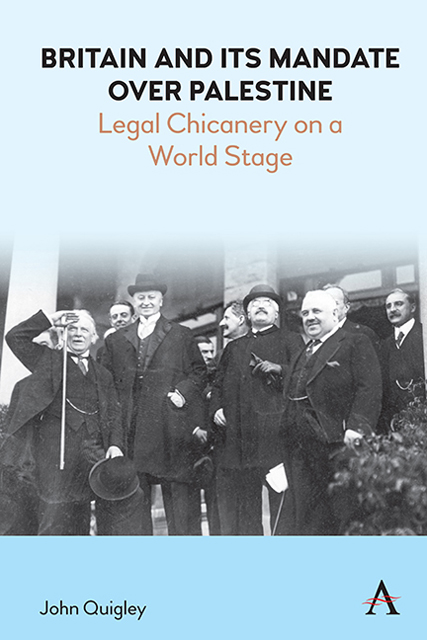Book contents
- Frontmatter
- Contents
- Preface
- Setting the Stage: Was Britain’s Rule in Palestine Legal?
- 1 The Balfour Declaration Is the Focal Point for the Legal Situation of Palestine
- 2 The Balfour Declaration Was a Binding Commitment to the Jewish People
- 3 The Jewish National Home Meant a Jewish State
- 4 The Balfour Declaration Was Issued to Affirm Jewish Rights in Palestine
- 5 The Paris Peace Conference Raised Jewish Statehood to the International Level
- 6 Britain’s Allies Made the Balfour Declaration an International Commitment
- 7 Britain’s Allies Endorsed Jewish Rights
- 8 Britain Took on Palestine Because of the League’s Mandate System
- 9 The League of Nations Protected Palestine’s Arab Population
- 10 Britain Was Given Palestine by the League of Nations
- 11 The League of Nations Put the Palestine Mandate into Legal Force
- 12 The Peace Treaty with Turkey Legalized Britain’s Status in Palestine
- 13 The Palestine Mandate Document Was a Treaty between Britain and the League
- 14 The League of Nations Required Britain to Implement the Balfour Declaration
- 15 The Palestine Mandate Document Implemented the League Covenant
- 16 The Palestine Mandate Document Recognized Jews as a National Group
- 17 The Palestine Mandate Document Bound Britain to the Balfour Declaration
- 18 The International Community Committed Itself to the Balfour Declaration
- 19 Britain Held Legal Status in Palestine
- 20 The United Nations Charter Carried Forward a Jewish Entitlement to Statehood
- Postscript: Why History Matters
- Documents Annex
- Notes
- Bibliography
- Index
12 - The Peace Treaty with Turkey Legalized Britain’s Status in Palestine
Published online by Cambridge University Press: 10 January 2023
- Frontmatter
- Contents
- Preface
- Setting the Stage: Was Britain’s Rule in Palestine Legal?
- 1 The Balfour Declaration Is the Focal Point for the Legal Situation of Palestine
- 2 The Balfour Declaration Was a Binding Commitment to the Jewish People
- 3 The Jewish National Home Meant a Jewish State
- 4 The Balfour Declaration Was Issued to Affirm Jewish Rights in Palestine
- 5 The Paris Peace Conference Raised Jewish Statehood to the International Level
- 6 Britain’s Allies Made the Balfour Declaration an International Commitment
- 7 Britain’s Allies Endorsed Jewish Rights
- 8 Britain Took on Palestine Because of the League’s Mandate System
- 9 The League of Nations Protected Palestine’s Arab Population
- 10 Britain Was Given Palestine by the League of Nations
- 11 The League of Nations Put the Palestine Mandate into Legal Force
- 12 The Peace Treaty with Turkey Legalized Britain’s Status in Palestine
- 13 The Palestine Mandate Document Was a Treaty between Britain and the League
- 14 The League of Nations Required Britain to Implement the Balfour Declaration
- 15 The Palestine Mandate Document Implemented the League Covenant
- 16 The Palestine Mandate Document Recognized Jews as a National Group
- 17 The Palestine Mandate Document Bound Britain to the Balfour Declaration
- 18 The International Community Committed Itself to the Balfour Declaration
- 19 Britain Held Legal Status in Palestine
- 20 The United Nations Charter Carried Forward a Jewish Entitlement to Statehood
- Postscript: Why History Matters
- Documents Annex
- Notes
- Bibliography
- Index
Summary
An element of the Narrative, as we have just seen, was that Britain was lawfully in Palestine. Had Britain gained sovereignty by the Treaty of Lausanne, it would have had status in Palestine sufficient to exercise a mandate. The Treaty of Lausanne, however, gave Britain nothing.
As events unfolded in 1923, Britain did not try to tell the League of Nations what it would later say in the 1947 explanation. League Council members knew that the Treaty of Sèvres was dead. They knew that the Treaty of Lausanne was not yet ratified, so they would have seen through an explanation like the one devised for the report to the United Nations in 1947.
Once the Treaty of Lausanne was signed, however, the British Government tried to fashion an argument that, were it to be ratified, it would give Britain legal status in Palestine. This was Curzon's argument to the League Council in his16 August 1923 communication that we saw in Chapter 11. The defunct Treaty of Sèvres had specified sovereignty to the Principal Allied Powers and had recited that the Balfour Declaration was to be applied. The Treaty of Lausanne had nothing of that. All Curzon had was its Article 16, whose text bears repeating. It read:
Turkey hereby renounces all rights and title whatsoever over or respecting the territories situated outside the frontiers laid down in the present Treaty and the islands other than those over which her sovereignty is recognised by the said Treaty, the future of these territories and islands being settled or to be settled by the parties concerned.
It was the final clause of Article 16 that Curzon recited to the League Council in August 1923. To repeat, in his communication to the League Council, Curzon interpreted this phrase to mean, “Turkey has agreed to accept the disposal of Palestine effected by the parties concerned.” Article 16, however, did not identify those parties. Nor did it specify what may have already been “settled.” At San Remo, the Principal Allied Powers had “settled” nothing but had only anticipated that Britain would keep Palestine and implement the Balfour Declaration if that would be agreed by Turkey in a peace treaty.
- Type
- Chapter
- Information
- Britain and its Mandate over PalestineLegal Chicanery on a World Stage, pp. 89 - 96Publisher: Anthem PressPrint publication year: 2022



